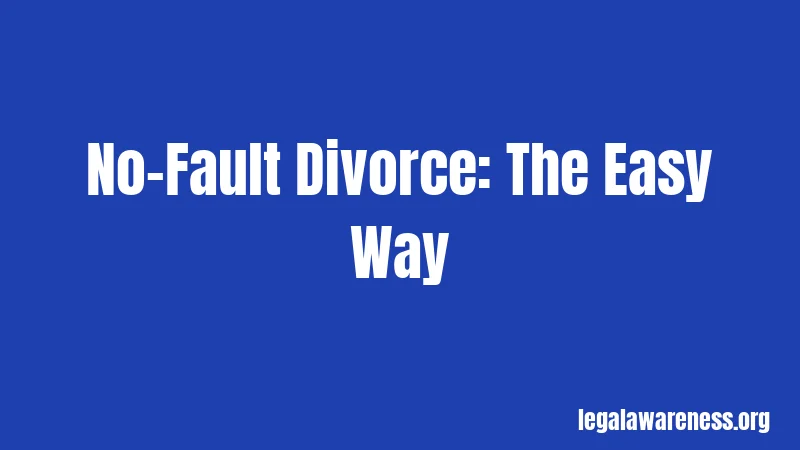Divorce Laws in Georgia (2026): The Complete Breakdown
Most people going through divorce have no idea what they’re actually facing. The laws are confusing. The process feels overwhelming. And honestly? The rules in Georgia are stricter than you might think.
Let me break down exactly what you need to know about getting divorced in Georgia. No legal jargon. Just the facts.
What Makes Georgia Divorce Different?

Georgia allows both fault and no-fault divorces. That’s right, you have options.
You can blame your spouse for the marriage ending. Or you can simply say it’s broken beyond repair. Both paths are legal here.
Here’s the deal. Most people choose the no-fault route. It’s faster, cheaper, and way less drama.
Basic Requirements to File
You can’t just wake up and file for divorce. Georgia has rules you must follow first.
The Residency Rule
Either you or your spouse must live in Georgia for six months. This is non-negotiable. The court needs proof you’re actually a resident.
You’ll file in the county where your spouse lives. If they don’t live in Georgia, you file where you live. Pretty straightforward.
The Filing Fee
Expect to pay between $200 and $250 to file. The exact amount depends on your county. Some counties charge $218, others charge up to $250.
Can’t afford it? You might qualify for a fee waiver. Ask the court clerk about filing an Affidavit of Indigence.
No-Fault Divorce: The Easy Way

This is the most common type of divorce in Georgia. Seriously, most couples go this route.
You tell the court your marriage is “irretrievably broken.” That’s the legal term. It basically means the marriage is toast and there’s no fixing it.
No pointing fingers. No proving anyone did anything wrong. You both just agree it’s over.
Sound complicated? It’s actually not.
The court doesn’t care why you’re divorcing. They just need to know reconciliation isn’t happening. Both of you move on with your lives.
Fault-Based Divorce: When Someone’s to Blame
Georgia recognizes 12 fault-based grounds for divorce. These are the old-school reasons people used before no-fault became popular.
Why would anyone choose this route? Here’s where it gets interesting.
Proving fault can affect alimony. It can influence property division. Sometimes, it’s worth the extra effort.
The 12 Fault Grounds
Let me list them out:
Adultery (cheating on your spouse). Desertion for one full year. Cruel treatment (physical or mental abuse). Habitual intoxication (constant drunkenness). Conviction of a serious crime with two-plus years in prison. Incurable mental illness. Habitual drug addiction. Being too closely related by blood. Mental incapacity at the time of marriage. Impotency at the time of marriage. Forced or fraudulent marriage. Wife’s pregnancy by another man (unknown to husband at marriage).
Most people stick to four main grounds. Adultery, cruel treatment, desertion, and irretrievably broken.
The rest? They’re on the books but rarely used.
Proving Fault Takes Work
Hold on, this part is important. If you claim your spouse committed adultery or abused you, you need evidence.
Text messages. Photos. Witness testimony. Bank statements. Whatever proves your case.
It’s more expensive. It takes longer. And honestly? It’s way more stressful.
But there’s a reason people do it. Fault can disqualify your spouse from receiving alimony. That alone can save you thousands.
Contested vs Uncontested: What’s the Difference?

This determines everything. Your cost. Your timeline. Your stress level.
Uncontested Divorce
You both agree on everything. Child custody. Property division. Alimony. All of it.
You submit your agreement to the court. The judge reviews it. If everything looks fair, boom. You’re divorced.
Cost: $300 to $5,000 total. Timeline: About 2 months. Stress level: Minimal.
Most couples with uncontested divorces spend around $800 to $1,500 without children. With kids? Maybe $1,200 to $1,800.
Contested Divorce
You disagree on major issues. Maybe it’s custody. Maybe it’s who gets the house. Maybe it’s both.
Now you’re looking at lawyers. Court hearings. Possibly mediation. Maybe even a trial.
Cost: $15,000 to $50,000 or more. Timeline: Months or even years. Stress level: Through the roof.
With children involved, contested divorces average around $23,500. Without kids? Still around $15,000.
Trust me, this adds up fast.
The Mandatory Waiting Period
Georgia requires a 30-day waiting period. The clock starts when your spouse gets served with divorce papers.
You cannot finalize your divorce before those 30 days pass. The court wants to give you time to reconsider.
Honestly, this is the minimum. Most divorces take way longer.
Uncontested divorces usually take 45 to 60 days total. Contested divorces? Six months to two years isn’t unusual.
Property Division: How Georgia Splits Assets
Georgia uses “equitable distribution.” That doesn’t mean equal. It means fair.
The court looks at what’s fair based on your situation. Sometimes that’s 50/50. Sometimes it’s not.
Marital vs Separate Property
Here’s what counts as marital property. Anything earned or bought during the marriage. Retirement contributions made while married. Income from either spouse during the marriage. Business income generated during the marriage.
This all gets divided in the divorce.
Separate property stays with whoever owned it. Things like property you owned before marriage. Inheritances you received. Gifts specifically given to you (not both of you). Assets outlined in a prenup or postnup.
The Commingling Problem
Wait, it gets trickier. If you mix separate and marital property, you might lose the protection.
For instance, you inherit $50,000. You deposit it in a joint bank account with marital money. Now that $50,000 might be considered marital property.
Keep inheritances separate. Use separate accounts. Document everything.
Retirement Accounts and Pensions
Retirement money earned during marriage is marital property. Both spouses have a claim to it.
Dividing retirement accounts requires something called a QDRO. That’s a Qualified Domestic Relations Order.
Your lawyer creates it. The court approves it. Then the retirement plan administrator divides the account.
It’s a multi-step process. But it’s necessary to legally split pensions and 401(k)s.
Alimony: Who Gets Spousal Support?
Georgia doesn’t hand out alimony easily. You need a good reason.
The court considers several factors. How long were you married? Can one spouse support themselves? Did one spouse give up their career for the family? What’s each person’s earning potential?
Types of Alimony
Georgia has different types of spousal support.
Temporary alimony gets paid during the divorce process. It helps the lower-earning spouse pay bills until everything’s final.
Permanent alimony continues after divorce. Usually awarded in long-term marriages where one spouse can’t work due to age or disability.
Rehabilitative alimony is short-term support. It helps a spouse get training or education to become self-sufficient.
The Adultery Rule
Here’s something crucial. If you committed adultery or deserted your spouse, you probably won’t get alimony.
Georgia law is clear on this. Cheaters and deserters don’t get financial support.
Even if you need the money. Even if you can’t work. Fault matters here.
Short Marriages Get Nothing
Okay, this one surprises people. If your marriage was brief, forget about alimony.
A six-month marriage? Not happening. Even a two-year marriage probably won’t qualify.
The court figures short marriages don’t create enough financial dependence to justify ongoing support.
Child Custody: Best Interests of the Child
Georgia courts focus on one thing. What’s best for the kids.
The court presumes joint legal custody is best. That means both parents make major decisions together. School. Medical care. Religion. The big stuff.
Physical custody determines where the child lives. One parent usually gets primary physical custody. The other gets visitation.
Factors Courts Consider
The judge looks at everything. Each parent’s ability to care for the child. The child’s relationship with each parent. Each parent’s home environment. Work schedules and availability. Any history of abuse or neglect. The child’s preference (if they’re old enough).
Nobody gets automatic preference. Not moms. Not dads. It’s about what serves the child best.
Child Support: The New 2026 Rules
Big changes hit Georgia in 2026. Honestly, these are significant updates.
Senate Bill 454 brought major changes to child support calculations. Here’s what’s different.
New Basic Child Support Obligation Table
This took effect July 1, 2024. It adjusted payment amounts based on updated economic data.
Mandatory Parenting Time Adjustment
Starting January 1, 2026, this became mandatory. Previously, judges could adjust support based on parenting time. Now they must.
If you have significant parenting time, your support obligation drops. Makes sense, right?
Low-Income Adjustment
Also mandatory as of January 1, 2026. Before, this was optional.
Now low-income parents get standardized adjustments. It’s fairer for everyone.
Veterans Benefits Consideration
Georgia now considers VA disability benefits for children in support calculations. If a disabled veteran receives benefits for their kids, that factors into the equation.
The non-custodial parent almost always pays child support. The amount follows state guidelines based on income and parenting time.
How to File for Divorce in Georgia
Ready to start the process? Here’s your roadmap.
Step 1: Gather Your Documents
You’ll need marriage certificate. Birth certificates for any children. Financial records (bank statements, tax returns, pay stubs). Property deeds and titles. Debt information.
Get organized now. It saves time and money later.
Step 2: Complete the Forms
Georgia provides free divorce forms online. Each county’s Superior Court website has them.
Forms differ based on whether you have children. Make sure you download the right packet.
Step 3: File with the Court
Take your completed forms to the Superior Court clerk’s office. You’ll pay the filing fee.
File in the county where your spouse lives. Or where you live if your spouse moved recently or lives out of state.
Step 4: Serve Your Spouse
Your spouse must receive official notice. You can’t just hand them the papers yourself.
Options include the sheriff ($50 to $75). Private process server ($50 to $100). Acknowledgment of service (free if your spouse cooperates).
Step 5: Wait for Response
Your spouse has 30 days to respond. If they agree with everything, you move forward quickly. If they contest issues, buckle up for a longer process.
Step 6: Attend Required Programs
If you have children, both parents must complete a parenting seminar. This costs $30 to $50.
The class teaches co-parenting skills. It’s mandatory in Georgia.
Step 7: Finalize the Divorce
Uncontested cases might need just one hearing. The judge reviews your agreement. If everything’s in order, they sign the final decree.
Contested cases involve multiple hearings. Maybe mediation. Possibly a trial. It depends on what you’re fighting about.
Mediation: The Middle Ground
Many contested divorces use mediation. A neutral third party helps you negotiate.
Mediation costs $500 to $2,000 typically. You split it with your spouse.
Wondering if this applies to you? If you’re stuck on one or two issues but agree on most things, mediation might work.
It’s cheaper than trial. Faster too. And you control the outcome instead of leaving it to a judge.
Do You Need a Lawyer?
Technically, no. You can represent yourself in Georgia.
But here’s my opinion. If your divorce involves kids, significant assets, or any contested issues, get a lawyer.
Mistakes cost more in the long run. Unfair agreements are hard to undo. A lawyer protects your rights.
Attorney Costs
Georgia divorce lawyers charge $200 to $600 per hour. The average is around $250 to $300.
Many offer flat fees for uncontested divorces. Around $800 to $1,800 depending on complexity.
Some attorneys offer payment plans. Ask about options during your consultation.
Special Circumstances
Not every divorce is straightforward. Here are some unique situations.
Military Divorces
Active duty service members have extra protections. Deployment can delay proceedings. Military benefits require special handling.
The process is the same otherwise. But timing and benefit division get complicated.
Domestic Violence
If you’re in danger, file for a protective order immediately. Georgia takes domestic abuse seriously.
Abuse affects custody decisions. It can influence alimony. Document everything and tell your lawyer.
Same-Sex Divorces
Georgia handles same-sex divorces exactly like opposite-sex divorces. Same rules. Same processes. Same rights.
Mistakes to Avoid
People mess this up all the time. Don’t be one of them.
Hiding Assets
The court will find out. Penalties include paying your spouse’s attorney fees and getting less in the final split.
Be honest about money. Always.
Using Kids as Weapons
Don’t trash-talk your spouse to the kids. Don’t use custody as leverage. Don’t withhold visitation.
Judges hate this. It hurts your custody case.
Refusing to Compromise
Fighting over every fork and spoon costs thousands. Pick your battles wisely.
Not sure what counts as a violation? Ask yourself if it’s worth $5,000 in legal fees.
Posting on Social Media
Your lawyer will tell you to stay off Facebook. Listen to them.
Everything you post can be used against you. Photos from parties. Comments about your spouse. All of it.
Life After Divorce
Your decree is signed. Now what?
Update Everything
Change your name on legal documents if you’re reverting to your maiden name. Update your will and beneficiaries. Revise your health insurance. Change passwords on shared accounts.
Create a New Budget
Living on one income is different. Factor in new expenses like rent if you moved. Health insurance premiums. Child support payments or receipts.
Build an emergency fund. Aim for three to six months of expenses saved.
Follow the Decree
Your divorce decree is a court order. Violating it has consequences.
Pay child support on time. Follow the custody schedule. Honor property division terms.
Need to modify something? File a formal motion with the court. Don’t just change things on your own.
When to Modify Your Decree
Life changes. Sometimes your divorce decree needs updating too.
You can request modifications for child custody. Child support amounts. Sometimes even alimony.
You need to show a “material change in circumstances.” Job loss. Serious illness. Relocation. Things like that.
File a modification petition with the same court that granted your divorce. Both spouses get to argue their case.
Frequently Asked Questions
Can I get a divorce if my spouse doesn’t want one?
Yes. Georgia allows one spouse to file even if the other disagrees. Your spouse can’t force you to stay married.
How long does a Georgia divorce take?
Minimum 31 days after serving your spouse. Uncontested divorces typically take 45 to 60 days total. Contested divorces can take six months to two years or longer.
Will my spouse get half of everything I own?
Not necessarily. Georgia divides property equitably, not equally. The court considers multiple factors to determine what’s fair.
Can I date while my divorce is pending?
Legally, yes. But it can affect your case. Dating during divorce can impact alimony decisions and child custody. Most lawyers advise waiting until the decree is final.
Do I have to pay my spouse’s attorney fees?
Sometimes. If there’s a big income gap, the court might order you to contribute. Or if your spouse proves you acted in bad faith during the divorce.
Final Thoughts
Divorce in Georgia isn’t simple. But understanding the process helps.
Know your options. Understand the costs. Pick your battles carefully.
Most importantly, protect yourself. Get organized. Document everything. Consider hiring a lawyer for complex issues.
You’re not alone in this. Thousands of Georgians go through divorce every year. The system is designed to help you move forward.
Stay informed. Stay focused. And when in doubt, consult with a qualified Georgia divorce attorney who can guide you through your specific situation.
References
- Georgia Code § 19-5-3 – Grounds for Total Divorce. Available at: https://law.justia.com/codes/georgia/title-19/chapter-5/section-19-5-3/
- Georgia Superior Courts – Divorce Information and Forms. Available at: https://georgia.gov/file-divorce
- FindLaw – Georgia Divorce Laws. Available at: https://www.findlaw.com/state/georgia-law/georgia-legal-requirements-for-divorce.html
- Georgia Courts – New Child Support Laws (Senate Bill 454). Available at: https://grishamandpoole.com/blog/new-georgia-child-support-laws-2026/
- WomensLaw.org – Georgia Divorce Information. Available at: https://www.womenslaw.org/laws/ga/divorce
